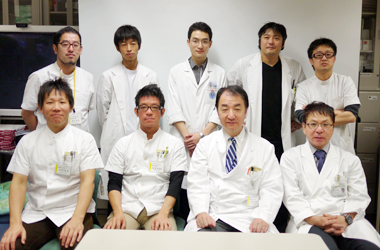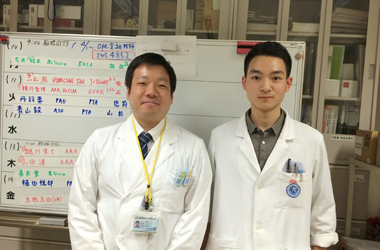Clinical Exchange in Japan
Welcome to Japan and Nagoya University school of Medicine!
Clinical Clerkship in Nagoya University
Li Xuan Shu from China
period: 2014/10/27-11/28
During my clerkship in Nagoya University, when people asked me if this was my first time to Japan, I said yes, and I also told them this would definitely not be the last time. Without any question, my experience in Nagoya University was extremely valuable in my life.
Since I only had a five-week clerkship in Nagoya University, I chose three departments in order to have a relatively comprehensive understanding about hospital and health care system in Japan. During my stay in vascular surgery department, Professor Komori and other doctors gave me a lot of opportunities to take part in surgeries and have a closer look at all those operations. What’s more, they even paused the procedures to explain some key points to me, which helped me to get a better understanding about the surgeries. In the ward, every doctor was willing to explain the medical history of patients to me, and I also got to know some interesting cases. And thanks to the instruction from all the doctors in plastic and reconstruction surgery department, I learned how to do better sutures. Also, what I learned here was more than just medical knowledge. When I observed Japanese doctors treated patients so carefully, I felt it was really impressive and saw the true spirit of health care.
As for my four-day clerkship rotation in general medicine department, I think it can be described as, in J.R.R. Tolkien's word, an unexpected journey. In the past, general medicine, in my mind, was just a department which provided people with all the fundamental health care. But my experience here helped me discover a general medicine more than that.
I feel very lucky that I got the opportunity to visit the rural clinic in Nagatsugawa. Thanks to Dr. Okazaki's explanation, I got a glimpse at the health care system of rural area in Japan. To be honest, all the environment and facilities there are far better than the rural health care center in China. Even though doctors works there are not full-time, they can still provide adequate management of chronic diseases for the citizens, especially considering some of the doctors come from university hospitals. That system is quite different from what we have in China and is definitely a very good reference.
Also, I'm very surprised about the development of traditional Chinese medicine in Japan. According to Dr. Hu's introduction, I found TCM here had developed a totally different work mode from China. Not only are the quality of each herb ensured, but also dose of every material is settled precisely. And all of the work should be beneficial for the further research of TCM.
Outside the hospital, doctors in all those departments were very warmhearted and kind. I really enjoyed going out and having meals together. During that time, we talked about many kinds of topics freely, from lifestyle to culture, from troubles of daily life to tax policy. The more we talked, the more we understood about each other, each country, and even each culture. And that, is definitely what I value most.
Also, I want to say thanks to officers of International Affair Office for your kind help all the time and every doctor who supported me. It was you who gave me a wonderful time in Japan.

With doctors of vascular surgery

With resident Mr. Watanabe
Click here to read other stories
Nagoya University Graduate School of Medicine